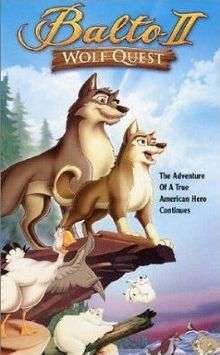Balto II: Wolf Quest
| Balto II: Wolf Quest | |
|---|---|
 DVD release cover | |
| Directed by | Phil Weinstein |
| Produced by | Phil Weinstein |
| Screenplay by | Dev Ross |
| Starring |
|
| Music by | Adam Berry |
| Edited by |
|
Production company | |
| Distributed by | Universal Studios Home Video |
Release date |
|
Running time | 75 minutes |
| Country | United States |
| Language | English |
Balto II: Wolf Quest is a 2002 American direct-to-video sequel to Universal Pictures/Amblin Entertainment's 1995 Northern animated film Balto.[1]
Plot
Balto and his mate Jenna have a new family of six puppies in Alaska. Five of their puppies look like their husky mother, while one pup named Aleu takes her looks from her wolfdog father. When they all reach eight weeks old, all of the other pups are adopted to new homes, but no one wants Aleu due to her wild animal looks, forcing her to live with her father. A year later when she is grown, Aleu is almost killed by a hunter who mistakes her for a wild wolf. Balto tells Aleu the truth about her wolf heritage, causing her to run away, hoping to find her place in the world. Balto then goes out into the Alaskan wilderness to find her. At the same time, Balto has been struggling with strange dreams of a raven and a pack of wolves, and he cannot understand their meaning. Balto resolves to find the meaning of these dreams as he searches for Aleu. His friends Boris, Muk and Luk attempt to join him, but after they are halted by some unknown force, they realize that this journey is meant only for the father and daughter themselves.
Taking refuge in a cave, Aleu meets the field mouse Muru, who explains that Aleu should not be ashamed of her lineage, which tells her what she is but not who she is. Muru reveals himself to be Aleu's spirit guide, and tells her to go on a journey of self-discovery. Balto and Aleu reunite and reconcile, and find their way to the ocean, where they are attacked by a group of starving wolves led by Niju. The confrontation is defused by the elderly Nava, the true leader of the pack, who welcomes Balto and Aleu. Nava announces to his pack that the wolf spirit Aniu has contacted him in "dream visions". Aniu has told him that the caribou herd they depend on during the winter has moved across the ocean and will not return, and that they will soon be led by a new leader, "the one who is wolf but does not know". Nava believes that Balto, who is half wolf himself, is the chosen one that Aniu was speaking of. However, Niju refuses to abandon his homeland, and takes control of the pack, and plots to steal from other animal clans in the area to survive the winter.
Aleu has a "dream vision" of the caribou herd crossing a bridge made of ice floes. The next morning, Niju prepares to lead an attack on a clan of bears, but is stopped by Balto just as a large group of ice floes in the ocean come together to form a land bridge. Balto then leads the pack across the bridge until Nava falls behind. When Aleu attempts to help Nava, Niju attacks, and Balto doubles back to save them, leaving the pack leaderless. Nava cannot make the journey across the ice in his old age, and Balto tells Niju to go lead the clan. Niju refuses, too afraid to leave his home, and soon returns to the shore. Balto prepares to go to the pack, but Aleu realizes that her true place is to take leadership of the pack as Nava foretold. Balto and Aleu say goodbye to each other before Aleu rejoins the pack and takes over as leader. Back on shore, Nava bids farewell to Balto before going to look for Niju so they can survive together. The raven appears to Balto again, and transforms into Aniu, revealing herself to be his mother before he begins to make his way home.
Voice cast
- Maurice LaMarche as Balto
- Jodi Benson as Jenna
- Lacey Chabert as Aleu
- David Carradine as Nava
- Mark Hamill as Niju
- Charles Fleischer as Boris
- Peter MacNicol as Muru
- Rob Paulsen as Terrier, Sumac, Wolverine #2, singing voice of Muru
- Nicolette Little as Dingo
- Melanie Spore as Saba
- Kevin Schon as Muk, Luk, Wolverine #1
- Joe Alaskey as Hunter, Nuk
- Monnae Michaell as Aniu
- Mary Kay Bergman as Fox, Wolverine #3
- Jeff Bennett as Yak
- Frank Welker as The Grizzly Bear (uncredited)
Wolf Quest is one of the last movies Mary Kay Bergman contributed to before she committed suicide in November 1999.
Awards
Balto II: Wolf Quest was nominated for an Annie Award[2] in 2003 for "Outstanding Storyboarding in an Animated Television Production".
Writer Dev Ross was awarded the Humanitas Prize in 2002 for her script in the Children's Animation category.[3]
References
External links
| Wikiquote has quotations related to: Balto II: Wolf Quest |
- Balto II: Wolf Quest on IMDb
- Balto II: Wolf Quest at AllMovie
- Sourcecast Interview with director Phil Weinstein